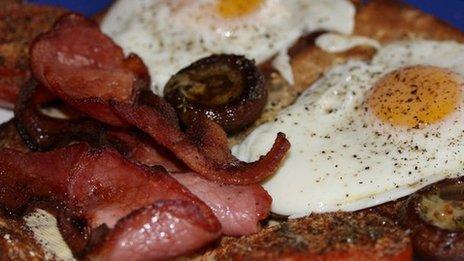Do you know your 'good' fat from your 'bad' fat?
- Published

Morrisons, Subway and Nestle are among firms signed up to the voluntary deal between industry and government to lower saturated fat levels in food
As food retailers and manufacturers sign a pledge to cut saturated fat levels in their products, how much do you know about the different types of fat in your diet?
Apart from saturated fat, others found naturally and artificially in food are unsaturated fat and trans fats.
Not all fat is bad - a little in your diet helps the body absorb certain nutrients.
And fat can be a source of energy, also providing essential fatty acids and some vitamins - such as vitamins A and D.
So which fats should you be eating more of and which should you look to reduce?
Saturated fat
According to - an online healthcare advice service - cutting down on foods that are high in saturated fat is important as part of a healthy diet.
A balanced diet should contain more unsaturated fat than saturated fat, such as that found it meat pies
Such foods include, butter, lard, chocolate, cakes, pastries and meat products, including sausages and pies.
Most people eat too much saturated fat: around 20% more than the recommended maximum, studies by the British Dietetic Association say.
Current Department of Health daily recommendations say the average man should eat no more than 30g of saturated fat a day, while the average woman should eat no more than 20g a day.
A diet high in saturated fat can increase low-density lipoprotein cholesterol levels (otherwise known as bad cholesterol) in blood over time, increasing the risk of heart disease.
But that risk has recently been disputed.
Writing in the British Medical Journal, cardiologist Dr Aseem Malhotra says saturated fat has been "demonised for decades" with any link to heart disease not fully supported by scientific evidence.
He says the food industry has compensated for lowering saturated fat levels by replacing them with sugar.
Unsaturated fat
Avocados are a source of unsaturated fat
Eating a diet of unsaturated fats can help lower bad cholesterol levels in the blood and increase levels of high-density lipoproteins (known as good cholesterol).
Saturated fats can be replaced in a balanced diet with these healthier monounsaturated and polyunsaturated fats, which are found in many of foods, including:
Oily fish, such as salmon, sardines and mackerel
Nuts and seeds
Sunflower and olive oils
Fruit and vegetables, including avocados
Oily fish provides omega-3 polyunsaturated fats, the richest source of that particular type.
Omega-3 oils can help lower blood triglyceride levels, prevent blood from clotting and maintain a regular heart rhythm.
The British Heart Foundation says we should aim to eat two portions of fish a week, one of which should be oily.
It also recommends a small amount of monounsaturated fats to help maintain healthy cholesterol levels.
Trans fats
The third type of fat that can be found in the diet, is trans fats.
Natural trans fats are found at low levels in some foods, including meat and dairy products.
Eating fewer biscuits and cakes can reduce trans fats in a person's diet
Artificial trans fats are made when oil goes through a process of hydrogenation, known as hydrogenated fat.
It can be used for frying.
Artificial trans fats can also be found in some processed foods, such as biscuits and cakes, and are sometimes used to give products a longer shelf life.
A diet high in trans fats can also lead to high levels of bad cholesterol in the blood, but most people in the UK do not eat a lot of trans fats. On average, we eat about half the recommended maximum.
Most UK supermarkets have removed hydrogenated vegetable oil from their products.
NHS Choices says we eat a lot more saturated fats than trans fats, but says reducing the amount of saturated fat is more important than reducing the amount of trans fats.
Sources: Department of Health, British Heart Foundation, NHS Choices and NHS Fat Facts.
- Published26 October 2013
- Published26 October 2013
- Published26 October 2013